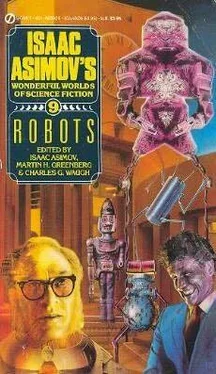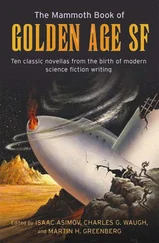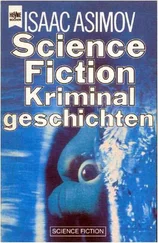Frederik Pohl - Isaac Asimov's Worlds of Science Fiction. Book 9 - Robots
Здесь есть возможность читать онлайн «Frederik Pohl - Isaac Asimov's Worlds of Science Fiction. Book 9 - Robots» весь текст электронной книги совершенно бесплатно (целиком полную версию без сокращений). В некоторых случаях можно слушать аудио, скачать через торрент в формате fb2 и присутствует краткое содержание. Год выпуска: 1989, ISBN: 1989, Издательство: Robinson Publishing, Жанр: Фантастика и фэнтези, на английском языке. Описание произведения, (предисловие) а так же отзывы посетителей доступны на портале библиотеки ЛибКат.
- Название:Isaac Asimov's Worlds of Science Fiction. Book 9: Robots
- Автор:
- Издательство:Robinson Publishing
- Жанр:
- Год:1989
- ISBN:ISBN: 1-85487-041-6
- Рейтинг книги:4 / 5. Голосов: 1
-
Избранное:Добавить в избранное
- Отзывы:
-
Ваша оценка:
- 80
- 1
- 2
- 3
- 4
- 5
Isaac Asimov's Worlds of Science Fiction. Book 9: Robots: краткое содержание, описание и аннотация
Предлагаем к чтению аннотацию, описание, краткое содержание или предисловие (зависит от того, что написал сам автор книги «Isaac Asimov's Worlds of Science Fiction. Book 9: Robots»). Если вы не нашли необходимую информацию о книге — напишите в комментариях, мы постараемся отыскать её.
Isaac Asimov's Worlds of Science Fiction. Book 9: Robots — читать онлайн бесплатно полную книгу (весь текст) целиком
Ниже представлен текст книги, разбитый по страницам. Система сохранения места последней прочитанной страницы, позволяет с удобством читать онлайн бесплатно книгу «Isaac Asimov's Worlds of Science Fiction. Book 9: Robots», без необходимости каждый раз заново искать на чём Вы остановились. Поставьте закладку, и сможете в любой момент перейти на страницу, на которой закончили чтение.
Интервал:
Закладка:
"Are you blind?" Hendricks said.
"No. I can see some,"
"How do you get away from the claws?"
"The claws?"
"The round things. That run and burrow."
"I don't understand."
Maybe there weren't any claws around. A lot of areas were free. They collected mostly around bunkers, where there were people. The claws had been designed to sense warmth, warmth of living things.
"You're lucky." Hendricks straightened up. "Well? Which way are you going? Back-back there?"
"Can I come with you?"
"With me?" Hendricks folded his arms. "I'm going a long way. Miles. I have to hurry." He looked at his watch. "I have to get there by nightfall."
"I want to come."
Hendricks fumbled in his pack. "It isn't worth it. Here." He tossed down the food cans he had with him. "You take these and go back. Okay?"
The boy said nothing.
"I'll be coming back this way. In a day or so. If you're around here when I come back you can come along with me. All right?"
"I want to come along with you now."
"It's a long walk."
"I can walk."
Hendricks shifted uneasily. It made too good a target, two people walking along. And the boy would slow him down. But he might not come back this way. And if the boy were really all alone
"Okay. Come along."
The boy fell in beside him. Hendricks strode along. The boy walked silently, clutching his teddy bear.
"What's your name?" Hendricks said, after a time.
"David Edward Derring."
"David? What-what happened to your mother and father?"
"They died."
"How?"
"In the blast."
"How long ago?"
"Six years."
Hendricks slowed down. "You've been alone six years?"
"No. There were other people for awhile. They went away."
"And you've been alone since?"
"Yes."
Hendricks glanced down. The boy was strange, saying very little. Withdrawn. But that was the way they were, the children who had survived. Quiet. Stoic. A strange kind of fatalism gripped them. Nothing came as a surprise. They accepted anything that came along. There was no longer any normal, any natural course of things, moral or physical, for them to expect. Custom, habit, all the determining forces of learning were gone; only brute experience remained.
"Am I walking too fast?" Hendricks said.
"No."
"How did you happen to see me?"
"I was waiting."
"Waiting?" Hendricks was puzzled. "What were you waiting for?"
"To catch things."
"What kind of things?"
"Things to eat."
"Oh." Hendricks set his lips grimly. A thirteen year old boy, living on rats and gophers and half-rotten canned food. Down in a hole under the ruins of a town. With radiation pools and claws, and Russian dive-mines up above, coasting around in the sky.
"Where are we going?" David asked.
"To the Russian lines."
"Russian?"
"The enemy. The people who started the war. They dropped the first radiation bombs. They began all this."
The boy nodded. His face showed no expression.
"I'm an American," Hendricks said.
There was no comment. On they went, the two of them, Hendricks walking a little ahead, David trailing behind him, hugging his dirty teddy bear against his chest.
About four in the afternoon they stopped to eat. Hendricks built a fire in a hollow between some slabs of concrete. He cleared the weeds away and heaped up bits of wood. The Russians' lines were not very far ahead. Around him was what had once been a long valley, acres of fruit trees and grapes. Nothing remained now but a few bleak stumps and the mountains that stretched across the horizon at the far end. And the clouds of rolling ash that blew and drifted with the wind, settling over the weeds and remains of buildings, walls here and there, once in awhile what had been a road.
Hendricks made coffee and heated up some boiled mutton and bread. "Here." He handed bread and mutton to David. David squatted by the edge of the fire, his knees knobby and white. He examined the food and then passed it back, shaking his head.
"No."
"No? Don't you want any?"
"No."
Hendricks shrugged. Maybe the boy was a mutant, used to special food. It didn't matter. When he was hungry he would find something to eat. The boy was strange. But there were many strange changes coming over the world. Life was not the same, anymore. It would never be the same again. The human race was going to have to realize that.
"Suit yourself," Hendricks said. He ate the bread and mutton by himself, washing it down with coffee. He ate slowly, finding the food hard to digest. When he was done he got to his feet and stamped the fire out.
David rose slowly, watching him with his young-old eyes.
"We're going," Hendricks said.
"All right."
Hendricks walked along, his gun in his arms. They were close; he was tense, ready for anything. The Russians should be expecting a runner, an answer to their own runner, but they were tricky. There was always the possibility of a slip-up. He scanned the landscape around him. Nothing but slag and ash, a few hills, charred trees. Concrete walls. But someplace ahead was the first bunker of the Russian lines, the forward command. Underground, buried deep, with only a periscope showing, a few gun muzzles. Maybe an antenna.
"Will we be there soon?" David asked.
"Yes. Getting tired!"
"No."
"Why, then?"
David did not answer. He plodded carefully along behind, picking his way over the ash. His legs and shoes were gray with dust. His pinched face was streaked, lines of gray ash in riverlets down the pale white of his skin. There was no color to his face. Typical of the new children, growing up in cellars and sewers and underground shelters.
Hendricks slowed down. He lifted his fieldglasses and studied the ground ahead of him. Were they there, someplace, waiting for him? Watching him, the way his men had watched the Russian runner? A chill went up his back. Maybe they were getting their guns ready, preparing to fire, the way his men had prepared, made ready to kill.
Hendricks stopped, wiping perspiration from his face. "Damn." It made him uneasy. But he should be expected. The situation was different.
He strode over the ash, holding his gun tightly with both hands. Behind him came David. Hendricks peered around, tight-lipped. Any second it might happen. A burst of white light, a blast, carefully aimed from inside a deep concrete bunker.
He raised his arm and waved it around in a circle.
Nothing moved. To the right a long ridge ran, topped with dead tree trunks. A few wild vines had grown up around the trees, remains of arbors. And the eternal dark weeds. Hendricks studied the ridge. Was anything up there? Perfect place for a lookout. He approached the ridge warily, David coming silently behind. It if were his command he'd have a sentry up there, watching for troops trying to infiltrate into the command area. Of course, if it were his command there would be the claws around the area for full protection.
He stopped, feet apart, hands on his hips.
"Are we there?" David said.
"Almost."
"Why have we stopped?"
"I don't want to take any chances." Hendricks advanced slowly. Now the ridge lay directly beside him, along his right. Overlooking him. His uneasy feeling increased. If an Ivan were up there he wouldn't have a chance. He waved his arm again. They should be expecting someone in the UN uniform, in response to the note capsule. Unless the whole thing was a trap.
"Keep up with me." He turned toward David. "Don't drop behind."
"With you?"
"Up beside me! We're close. We can't take any chances. Come on."
"I'll be all right." David remained behind him, in the rear, a few paces away, still clutching his teddy bear.
"Have it your way." Hendricks raised his glasses again, suddenly tense. For a moment-had something moved? He scanned the ridge carefully. Everything was silent. Dead. No life up there, only tree trunks and ash. Maybe a few rats. The big black rats that had survived the claws. Mutants-built their own shelters out of saliva and ash. Some kind of plaster. Adaptation. He started forward again.
Читать дальшеИнтервал:
Закладка:
Похожие книги на «Isaac Asimov's Worlds of Science Fiction. Book 9: Robots»
Представляем Вашему вниманию похожие книги на «Isaac Asimov's Worlds of Science Fiction. Book 9: Robots» списком для выбора. Мы отобрали схожую по названию и смыслу литературу в надежде предоставить читателям больше вариантов отыскать новые, интересные, ещё непрочитанные произведения.
Обсуждение, отзывы о книге «Isaac Asimov's Worlds of Science Fiction. Book 9: Robots» и просто собственные мнения читателей. Оставьте ваши комментарии, напишите, что Вы думаете о произведении, его смысле или главных героях. Укажите что конкретно понравилось, а что нет, и почему Вы так считаете.









